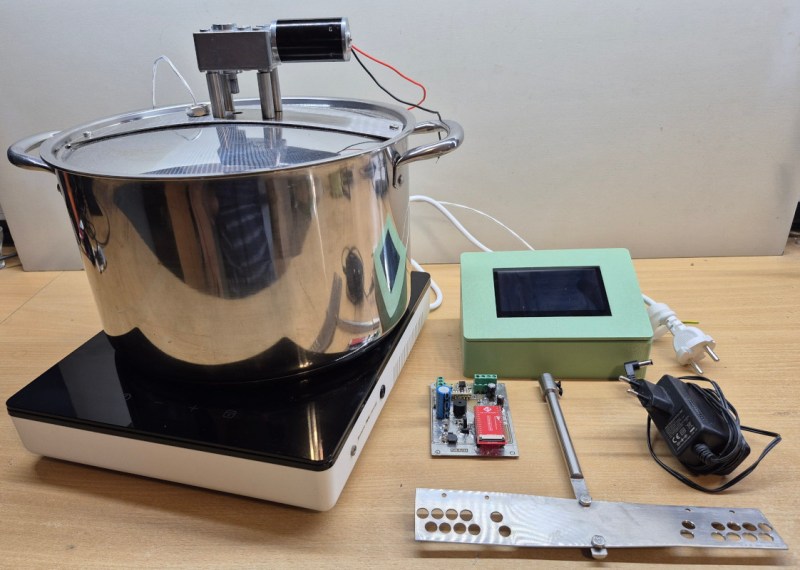There’s little more to making alcoholic beverages than sugar, water, yeast, and time. Of course those with more refined or less utilitarian tastes may want to invest a bit more care and effort into making their concoctions. For beer making especially this can be a very involved task, but [Fieldman] has come up with a machine that helps automate the process and take away some of the tedium.
[Fieldman] has been making beers in relatively small eight-liter batches for a while now, and although it’s smaller than a lot of home brewers, it lends itself perfectly to automation. Rather than use a gas stove for a larger boil this process is done on a large hot plate, which is much more easily controlled by a microcontroller. The system uses an ESP32 for temperature control, and it also runs a paddle stirrer and controls a screen which lets the brewer know when it’s time to add ingredients or take the next step in the process. Various beers can be programmed in, and the touchscreen makes it easy to know at a glance what’s going on.
For a setup of this size this is a perfect way to take away some of the hassle of beer brewing like making sure the stove didn’t accidentally get too hot or making sure it’s adequately stirred for the large number of hours it might take to brew, but it still leaves the brewer in charge for the important steps.
Beer brewing is a hobby with a lot of rabbit holes to jump down, and it can get as complicated as you like. Just take a look at this larger brewery setup that automates more tasks on a much larger scale.
















Super cool! Well done, mate!
You could further automate the cooling phase of the wort by using a heat exchanger, which would skip the step of moving the pot into the bigger bucket. But that’s optional.
What kind of beer do you normally brew with it?
Nice idea. I wonder if it’d be feasible to use heat pipes to cool it down. Then just a fan to cool the heat pipes.
https://en.m.wikipedia.org/wiki/Heat_pipe
I’ve seen some 1 barrel brewers use old window mount air conditioners to chill their beer for lager yeast or cold crashing. They submerge the cold side of the heat exchanger loop in an ethylene glycol water tank, then circulate the mix through a jacketed fermentation vessel or bright tank. You still need a fan on the hot side for heat dissipation, but I imagine they could use that side of the loop to maintain temps in the hot liquor tank.
I got a C in calc II and never passed thermodynamics so I have no idea on the efficiency of any of this. What I do remember from my stint in professional brewing is that its always easier to add heat than remove it. We were lucky to have really cold ground water to help chill the wort before it went into the vats.
I was wondering how they automated temperature control with that Ikea induction hob, as I have the same one and it needs a lot of manual operation. Turns out they’ve a whole separate project working out how to PWM control it, which is maybe the most impressive part of this whole setup.
My buddy has his own mad science brewery setup in his garage using a tankless water heater, pump, and coil to act as a recirculating heater heating up a pot of water/mash. He has a second pump that draws off that pot and pumps into a second pot where he loads the grain/etc. Once that pot hits a certain level a valve opens and it starts draining back into the first pot.
When enough time has elapsed and he is done he has a bank of valves and stainless pipes that diverts the mash into the appropriate conical fermenter. He has 6 modified mini fridges each with its own fermenter and temperature controller.
He has a quick fit hose/pump setup to drain the fermenter into a corny keg when the batch is done.
And finally, he has a modified chest freezer that holds 6 corny kegs and is plumbed to hoses that go through the wall to his home bar’s taps.
I hate beer, but I admire his setup.
I work in the wine industry and its always cool to see what is essentially the same process we use for wine fermentation done at a smaller scale.
There is some really cool mini brewery/distillery setups out there that people have DIYed.